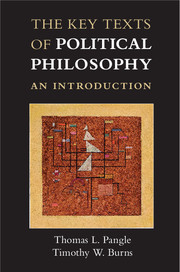Book contents
- Frontmatter
- Dedication
- Contents
- Acknowledgments
- Introduction
- Part I Classical Political Philosophy
- Part II Biblical Political Theology
- Part III Modern Political Philosophy
- 6 Machiavelli’s Discourses and Prince
- 7 Bacon’s New Atlantis
- 8 Hobbes’s Leviathan
- 9 Locke’s Second Treatise of Government
- 10 Montesquieu’s Spirit of the Laws
- Part IV Modernity in Question
- Name Index
- Subject Index
- References
7 - Bacon’s New Atlantis
Published online by Cambridge University Press: 05 October 2014
- Frontmatter
- Dedication
- Contents
- Acknowledgments
- Introduction
- Part I Classical Political Philosophy
- Part II Biblical Political Theology
- Part III Modern Political Philosophy
- 6 Machiavelli’s Discourses and Prince
- 7 Bacon’s New Atlantis
- 8 Hobbes’s Leviathan
- 9 Locke’s Second Treatise of Government
- 10 Montesquieu’s Spirit of the Laws
- Part IV Modernity in Question
- Name Index
- Subject Index
- References
Summary
Francis Bacon (1561–1626) is best known as the chief original articulator of the modern scientific method. His most important writings in this regard are The Advancement of Learning (1605) and The New Organon (1620). But Bacon was also a highly successful statesman under Queen Elizabeth and James the First, and – more momentously, for our purposes – an outspoken admirer of Machiavelli, as well as the employer and older friend of Thomas Hobbes. Inspiration from Bacon was gratefully acknowledged by subsequent early modern political philosophers such as Spinoza (another open admirer of Machiavelli) and Locke. Thomas Jefferson, arguably the most theoretically inclined of the American founders, counted Bacon (along with Newton and Locke) as one of “the three greatest men that have ever lived, without any exception, and as having laid the foundation of those superstructures which have been raised in the Physical and Moral sciences” (Letter to Richard Price, January 8, 1789, our emphasis).
Bacon’s Machiavellian Scientific Method
We can best begin to understand the relation between the scientific and the political strands in Bacon’s thought if we start from his expressed indebtedness to Machiavelli. In The Advancement of Learning, Bacon cites Machiavelli a full ten times, almost always favorably – and this at a time when such a display of favor to Machiavelli entailed considerable daring. Bacon similarly cites Machiavelli with approval in his Essays. Why Bacon does so, not only in his political but especially in his scientific works is not immediately apparent. We can identify, however, three key ideas in Machiavelli’s reflection on human nature that became roots of Bacon’s new method for the science of nature in general.
- Type
- Chapter
- Information
- The Key Texts of Political PhilosophyAn Introduction, pp. 223 - 245Publisher: Cambridge University PressPrint publication year: 2014



